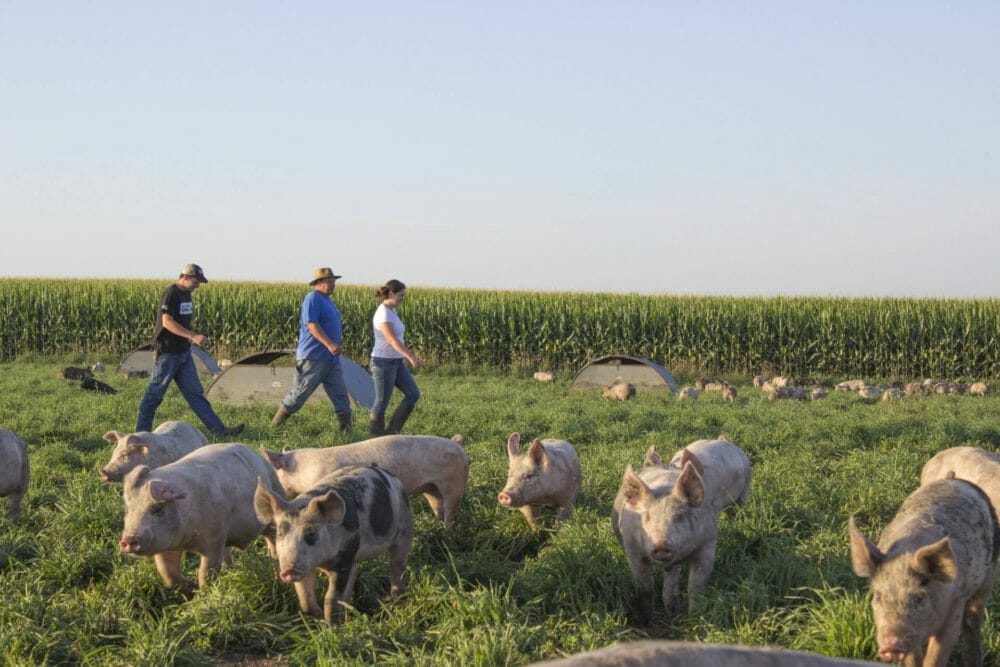When an entrenched big food company buys a progressive newcomer, skepticism over whether the startup can maintain its integrity under the parent company’s shadow often runs rampant. The situation was no different when Perdue purchased Niman Ranch in 2015.
According to Niman Ranch general manager Chris Oliviero, the relationship between itself and parent company Perdue, which purchased the brand in 2015, has been a harmonious one. Before taking the helm of Niman Ranch in March 2019, Oliviero worked for Perdue giving him a unique perspective of both sides of the post-acquisition relationship.
“Perdue has done a nice job of recognizing that for Niman to continue to be successful as a company, it needs to be able to do things differently If you were to talk to customers, farmers, or ranchers and ask what’s changed in the last four-and-a-half years since Perdue acquired Niman, I think you’d be hardpressed to find someone saying that there’s been some change,” he recently told AFN.
Niman sources pork, beef, and lamb from 767 farmers producing animals according to its specifications, such as providing high levels of welfare, and pasture raising hogs instead of keeping them confined indoors. Roughly two-thirds of its contract producers raise pork. Although lamb production primarily takes place on the West Coast, its pork and beef producers are spread throughout the US. It sells meat to foodservice and retail outlets. The beef is grain-finished. Perdue acquired a 100% grass-fed brand, Panorama, last year.
Based on Oliviero’s overview, the company takes excellent care of its producers, offering premiums in its production contracts to offset its high-touch, progressive welfare requirements. Contracts typically last for one year and Niman purchases the number of animals it committed to in the contract regardless of what happens, save for breaches like failing to provide adequate welfare. It will pick up as few as five hogs from a farmer, which makes no sense from a business standpoint but drives at the very heart of the company’s ethos: making it easier for new and young producers to get in the business and become profitable.
Compared to conventional meat production, Niman’s approach is a bit of an anomaly.
Instead of absorbing Niman within its structure and reshaping it to fit conventional meat production, Perdue has been a big help in terms of providing stability to the smaller-scale company, which can make a huge difference in the meat production industry where economies of scale reign supreme. Olivier0 reports that they just turned on the lights in a freshly-built expansion of Niman’s pork processing facility in Sioux City, Iowa, thanks to a substantial investment from Perdue.
But overall, the benefits have probably flown more towards Perdue, he explains. Niman’s efforts to engage with animal rights activist groups inspired Perdue to reach out to many of them around the same time that it acquired Niman. It also took note of how Niman organized its producers into regional work sessions to address specific challenges while creating camaraderie in its ranks.
Despite its success, however, technology plays a limited role on the farms of Niman’s contract producers who produce hogs and beef cattle. The livestock industry has seen an increase in tech offerings, but the segment has remained proportionally smaller to areas like commodity crop production, which is saturated in technologies aimed at everything from remote sensing to seed traits to biological crop protection. For Niman’s farmers, however, the disparity hasn’t caused any hard feelings
“It’s less of a priority for us. I think that there is a lot of benefit to the high-touch approach that our farmers and ranchers use. They spend a lot of time outside with these animals. If you focus on animal care, you have to be out looking at the animals,” he explains.
An average Niman producer only raises 450 hogs per year for the company due to the high-touch, high-effort approach that it demands. This number is a fraction of what more conventional pork producers may raise in a year. Niman currently lists more field agents than sales team members to ensure its producers have the resources they need to succeed.
“If you look at the infrastructure that is used whether it’s cattle, pork, or lamb, it’s still pretty basic. A lot of hoop barns, A-frames in pastures. That’s a big part of what we provide: a lower cost of entry for someone who wants to get into the farming business. If you wanted to get into confinement, you have to put out a lot of money to start there.”
Advancements are an area where he would be interested to see action, however, as well as any technologies geared towards lowering stress and improving opportunities for animals to express natural behaviors. Arguably less sexy areas in the agri-foodtech innovation world but many basic needs are yet to be met by tech.
“Sometimes the basics really appeal and it’s more important to do the basics right,” he says. The theme of tech tackling the basics appears to be resonating throughout the livestock industry these days. Recently, Ag Startup Engine backed a technology called Sentinel that’s developed a technology to help count pigs. This may seem like an incredibly menial task, but an improper headcount can cause serious problems and when a large group of animals is milling about, it can take several tries to get the right number.
As for being a niche meat producer in the day and age of plant-based protein, Oliviero feels confident about the company’s long-term trajectory.
“I think we are very well positioned even if this gains more traction. First, we are very small. Second, we produce premium products in terms of quality and price as well, so even for folks who are embracing a flexitarian lifestyle, those same people are paying more attention, they’re better informed. We have a very transparent approach to our business. That’s right in Niman’s wheelhouse.”




